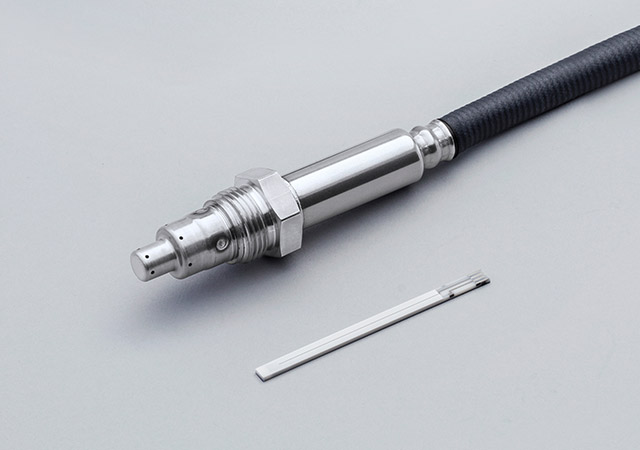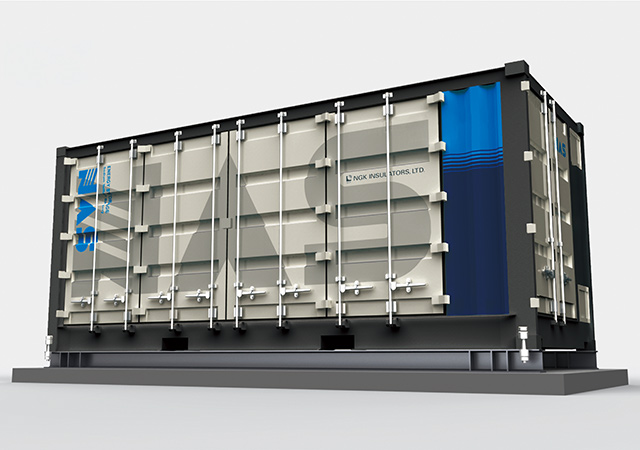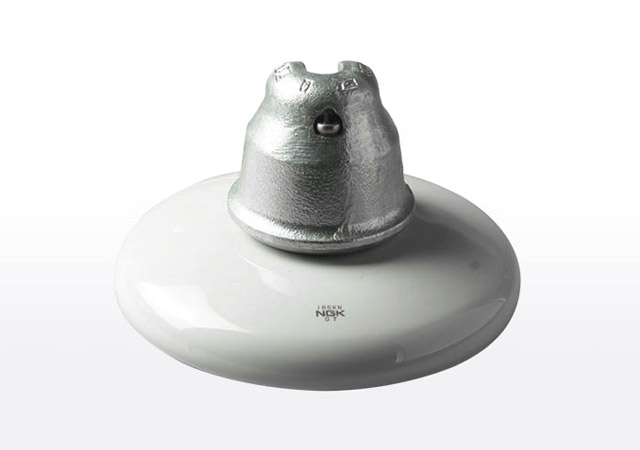About NGK
Management Policies
Basic Management Policies of the Company
The NGK Group Philosophy and NGK Group Vision: "Road to 2050" that we adhere to are as follows:
NGK Group Philosophy
Our Mission
“Enriching Human Life by Adding New Value to Society.”
Our Values
“Quality of People: Embrace challenges and teamwork”
“Quality of Products: Exceed expectations”
“Quality of Management: Social trust is our foundation”
NGK Group Vision: "Road to 2050"
We look ahead to a future society in 2050, taking the major trend towards carbon neutrality and the explosive evolution into a digital society as an opportunity for further development. We will work on driving Five Transformations: [1] Promotion of ESG management, [2] Profitability improvement, [3] Focus on R&D, [4] Focus on commercialization, and [5] Digital transformation (DX). With “Surprising Ceramics” as the slogan for our unique ceramic technologies, we intend to convert our business structure toward the “Third Foundation.”
Targeted Management Indicators and Capital Policy
The NGK Group is pursuing management that prioritizes capital efficiency based on return on equity (ROE) as one of our key management indicators. We employ return on invested capital (the NGK version of ROIC), which is closely linked to ROE, as a management indicator, and use business assets (accounts receivable, inventories and fixed assets) in lieu of invested capital, and operating income in lieu of after-tax operating income, to allow our business divisions to proactively take control of their targets. In addition to improving the profitability of our existing business, we aim to achieve profit growth by maintaining and improving the sales growth rate by focusing on R&D and marketing with the goal of “New Value 1000”, which is to achieve sales of new commercialized products of at least 100 billion yen by 2030.Aiming to achieve a minimum medium-to long-term target ROE of 10%, we will implement a capital policy that is conducive to the sustained enhancement of corporate value by accommodating changes in business risks. We will strive to reduce capital costs through communication with shareholders and investors, as well as conducting the decision-making process for business planning and capital investment, to secure earnings exceeding capital costs. We will also work on active shareholder returns, reviewing our payout ratio and dividend on equity (DOE) ratio. Through these efforts, we aim to maintain sound levels of profitability, capital turnover, and financial leverage, which are components of ROE, consistent with our business strategy while maintaining financial health of the Company.
Furthermore, as a management indicator that contributes to improving our corporate value, we use NGK Value-added, which takes into account CO2 emission costs, labor costs, R&D expenses, and ESG target achievement rate in operating income. In addition to fulfilling a wide range of social responsibilities, including efforts to reduce environmental load and respect human rights, we will actively invest in human capital and R&D, the sources of our future competitiveness, while striving to increase added value so that we can steadily realize profit growth.
Medium-to Long-Term Management Strategies and Issues to Be Addressed
The environment surrounding the NGK Group is expected to remain uncertain, with the Chinese economy slowing by the sluggish real estate market, Russia’s invasion of Ukraine and conflicts in the Middle East prolonging, and 2024 being a global election year. On the other hand, from a medium- to long-term perspective, efforts to achieve carbon neutrality in order to realize a decarbonized society are expanding as the effects of the progress of global warming, which is expressed as “global boiling,” are in a critical situation. Furthermore, with the arrival of the era of generative AI (artificial intelligence), we expect that information and communications will become more sophisticated and the development of a digital society will accelerate. With the aim of becoming a corporation that adds new value to society, the Group has set “A Company to contribute to carbon neutrality and a digital society with our unique ceramic technologies” as what it wants to be in the NGK Group Vision. Accordingly, the Group is pushing forward with the “Five Transformations” to bring the vision into being. Although there is concern that automotive-related products, the Group’s core business, will shrink as electrification advances, the Group will work on “Advancement of ESG management” and “Improving the earning capability of existing businesses and creating new businesses” in the attempt to expand the lineup of products related to carbon neutrality and a digital society for a future society of 2050 and transform its business structure.
The NGK Group’s initiatives for key issues are as follows:
Advancement of ESG management
The Group has placed ESG at the center of its corporate management to drive sustainable growth and transformation into what it wants to be in the future. Based on the NGK Group philosophy of “Enriching Human Life by Adding New Value to Society”, we will contribute to the realization of a sustainable society by providing new value through our unique ceramic technology, thereby meeting the expectations of society and gaining the trust of society. This is the NGK Group’s basic approach to sustainability. To realize the NGK Group philosophy, we aim to contribute to carbon neutrality and the realization of a digital society, while bearing in mind ESG (Environment, Society and Corporate Governance) and SDGs (Sustainable Development Goals), and to achieve sustainable corporate value.
In addition, the NGK Group has 36 Group companies (including 18 manufacturing companies) operating in 19 countries overseas. In order to achieve these goals and enhance management transparency and autonomy, we are working to improve the environment so that all group employees can act in accordance with fair values and international standards of judgment. As part of these efforts, the “NGK Group Code of Conduct” was established to lay out a path for executives and employees to follow, following the revision of the “NGK Group Corporate Business Principles”, which indicates the company’s stance toward fulfilling its social responsibility with a high ethical standard while complying with relevant laws and regulations, international rules, and their spirits inside and outside the country.
Under the ESG Management committee chaired by the President, the Board of Directors will appropriately supervise initiatives for the NGK Group’s sustainability issues, including ESG elements, with the aim of earning the trust of all stakeholders.
Environment (E)
Holding up the goal of achieving net zero CO2 emissions by 2050, the Group has formulated the “NGK Group Environmental Vision,” which is formed around making a contribution to carbon neutrality, a recycling-oriented society and harmony with nature. Based on it, the Group has compiled the “Carbon Neutrality Strategic Roadmap” and the “Five-year environmental plan” as concrete action plans and is striving to fulfill the goals therein. In fiscal 2025, the final year of the 5 year plan, we expect to achieve our target of 550,000 tons of CO emissions in Scope 1 and Scope 2 (a 25% reduction from fiscal 2013 levels). We also aim to achieve our milestone of 370,000 tons of emissions in fiscal 2030 (a 50% reduction from the same level) by switching all electricity used at overseas sites to renewable energy sources and installing solar power generation facilities with a total capacity of 32 megawatts at domestic and overseas manufacturing sites by fiscal 2025. In addition, in order to achieve the target ahead of schedule, we are developing technologies for firing ceramics with carbon-neutral fuels such as hydrogen and ammonia, gas separation membranes and DAC (Direct Air Capture) to directly capture CO2 in the atmosphere as technologies related to CO2 capture, utilization, and storage, and we are conducting demonstration tests for CO2 recycling and methanation. We are also promoting demonstration tests of methanation, which is a process to recycle CO2, and will continue to develop carbon-neutral-related products and services in addition to promoting demonstration and application within the NGK Group. In November 2023, we issued green bonds (unsecured corporate bond) for the third consecutive year. We will accelerate our efforts to provide environmentally effective products and services and to achieve carbon neutrality in our business and production activities.
Moreover, we are disclosing information on the Task Force on Climate-related Financial Disclosures (TCFD) on our website, etc., and expressed our support as an early adopter of the Task Force on Nature-related Financial Disclosures (TNFD) regarding our efforts to coexist with nature. We will continue to expand the disclosure of related information without lagging behind social demands.
Society (S)
The NGK Group will expand initiatives to respect human rights in its companies and supply chains, thereby contributing to the creation of a society in which the human rights of all people affected by business activities will not be violated. Not only did the Group establish the “NGK Group Human Rights Policy” based on the “United Nations’ Guiding Principles on Business and Human Rights” but it also disclosed a statement on the UK Modern Slavery Act. Furthermore, the Group endorses “Children’s Rights and Business Principles” and has declared that the Group will respect children’s rights in business activities and engage in social contribution activities and others for the promotion of children’s rights.
In the NGK Group Philosophy, the NGK Group positions “human resources that challenge and enhance each other” as one of our goals, and strives to realize our mission of “Enriching Human Life by Adding New Value to Society” and to work on “five reforms” toward realizing the NGK Group Vision. In order to achieve these goals, it is essential that each and every human resource plays an active role. In June 2023, we established the “NGK Group Human Capital Management Policy”, the “Human Resource Development Policy”, and the “Internal Environment Development Policy”, and will promote the enrichment of human resources who are engaged in five reforms through recruitment and training sessions, and the creation of an environment where such human resources can fully demonstrate their capabilities. We are providing diverse career paths that allow self-directed growth of each employee and also deploying various measures including creating an internal work environment through flexible work styles utilizing telecommuting and reduction of long working hours. In a bid to promote the advancement of women, we have set numerical targets for the percentage of female new college graduates hired and are expanding the scope of their responsibility in the organizations that they are assigned or transferred to. We have implemented a system to support early return from parental leave to encourage employees who took maternity and childcare leave to resume their careers early. In addition to systems such as providing training for employees returning from childcare leave and expansion and improvement of childcare leave for male employees, we have been working on creating an environment that allows women to thrive through organizing internal lectures that aim for deeper understanding of balancing work and family responsibilities. In respect of human resources overseas, approximately 60 percent of a total of about 20,000 employees of the Group are stationed overseas. We believe the advancement of local human resources is essential for prompt and appropriate decision-making based on the circumstances, culture and practices in each local community for management of the NGK Group. Therefore, we actively hire local human resources and assign them to senior management-level positions at overseas sites.
NGK has announced the “Declaration of Partnership Building” promoted by the Cabinet Office and the Small and Medium Enterprise Agency. In order to conduct fair and equitable transactions with the procurement partners that make up the supply chain in the NGK Group’s supply chain, as well as to achieve prosperity together, we have established the “NGK Group Procurement Policy” with “openness and fairness, partnership, and relationship with society” as the basic axes of procurement, taking into consideration global environmental conservation, respect for human rights, and the working environment. We also conduct detailed assessments of risks and CSR for sustainable procurement through visits to suppliers and surveys.
Governance (G)
With regard to corporate governance, in light of enhancing the functions of the Board of Directors, the Company appoints independent outside directors who can contribute to the Company’s sustainable growth and mid- to long-term improvement of corporate value. The number of independent outside directors is one-third or more of the total members of the Board of Directors. The Company also founded the Business Ethics Committee, whose primary members are outside directors, and it handles response to fraudulent acts or violations of laws and regulations where the officers and others of the Company have been involved and provides response, reports and advice to the Board of Directors. The committee strives to strengthen the compliance system by establishing a whistleblowing system (“Hotline”), which is directly linked to the Business Ethics Committee. This serves as a mechanism to prevent any such fraudulent act or violation of laws and regulations in addition to the existing Helpline System, which provides advice and receives reports from employees.
From the compliance perspective, the Company has established the NGK Group Code of Conduct as guidelines for all members of the NGK Group to conduct sound business activities based on a sense of ethics. Moreover, the “Basic Guidelines for NGK Group Compliance Activities” are in place with the aim of establishing a mechanism for evaluating and verifying its compliance activities, taken in various domains, in light of international norms and for continuous improvement based on shared understanding and values.
With regard to compliance with laws and regulations such as the Competition Law and the Foreign Corrupt Practices Law, the “NGK Group Anti-Corruption Policy” was newly established in April 2024. The NGK Group is also working to ensure thorough compliance by continuously sending messages from top management, providing compliance education to officers and employees of Group companies in Japan and overseas, implementing a Competition Laws Compliance Program in line with international standards, and utilizing the Competition Laws Compliance Handbook.
Regarding a quality compliance system, the Company has been working on improving corporate characteristics through enhancement of mechanisms such as quality control activities by the top management and direct guidance by the quality committee as well as ensuring thorough quality education for the management members and employees. In terms of safety of the working environment, the Company works on reducing work-related injuries by strengthening the control capability of each site across the NGK Group in addition to identifying significant accident risks and enhancing preventative measures through conducting risk assessment of the NGK Group companies in and outside Japan.
In respect of risk management, risks that are deemed significant from the management perspective are classified into categories of business environment, strategy and internal factors, and continuously reviewed. We have established various committees to manage individual risks, including sustainability issues within the NGK Group. As environmental changes are accelerating both in Japan and overseas, in order to establish an integrated risk management system from a company-wide perspective that connects across divisions to the Board of Directors, the Risk Management Committee was established in fiscal 2023 as a supervisory committee under the direct control of the President. And we started considering countermeasures for priority follow-up risks after obtaining approval from the Board of Directors.
Improving earning capacity of existing businesses and creating new businesses
The Group has developed a business portfolio policy in order to enhance corporate value from a company-wide perspective and carefully examines businesses from two perspectives: profitability measured using the NGK version of ROIC and growth potential that employs a net sales growth rate. We consider investing management resources in core businesses and business groups where future growth is anticipated. In addition, we evaluate the quantitative aspects of businesses in the low-growth, low-profit categories based on the annual and medium-term business plans and discuss their growth potential and profitability at internal strategy meetings, etc., which will be supervised by the Board of Directors as important matters concerning the company management. To decide on capital investments, we take into account the payback time of individual investments and the NGK version of ROIC as well as evaluations from the perspective of ESG that uses the internal carbon prices (ICP) and that has been adopted since fiscal 2022. In order to balance further sustainable profit growth with investment in human capital and intellectual capital, which will be the source of future corporate value, and at the same time comprehensively evaluate sustainability initiatives such as efforts to reduce environmental impact and respect human rights, we have introduced NGK Value-added as a management indicator, which takes into account CO2 emission costs, labor costs, R&D expenses, and ESG target achievement rate to operating income. We will connect this to the enhancement of corporate value by raising non financial value, which is not presented in financial statements, in addition to financial value, such as short-term profitability and medium to long-term growth potential.
In order to improve the profitability of each business, we will appropriately pass increased costs associated with global inflation on to selling prices, and at the same time, we are advancing the initiative of “manufacturing ∞ (chain) innovation” to further enhance our profitability. We are advancing the sophistication of manufacturing systems and global collaboration by utilizing digital technology, focusing on “production innovation activities” that bridge the gap between the ideal and the current situation in the manufacturing chain and “cost reduction activities”, which improve manufacturing costs by reducing losses at each factory. And, in response to soaring raw material and fuel costs and fluctuations in demand, we will lead to stronger profitability by further reducing costs, shortening lead times, and reducing inventory.
The entire NGK Group will accelerate DX promotion under the NGK Group Digital Vision. In addition to the manufacturing field, we will create value using data, such as materials informatics to develop new materials and shorten development lead time, and the use of the IP landscape in patent strategy. We will also promote thorough business efficiency and data collaboration in the head office and indirect divisions to reduce fixed costs and transform business performance and decision-making based on data.
As transforming the business structure requires the creation of new business, we have set up “New Value 1000” as the key measure to boost net sales of newly commercialized products to a minimum of 100 billion yen in 2030. The three business groups of Corporate NV Creation, tasked mainly with the marketing function, Corporate R&D with the Group’s unique differentiating technology and Corporate Manufacturing Engineering, responsible for manufacturing including prototyping and mass-production technology, coordinate to speed up the process from R&D to commercialization. We plan to invest 31 billion yen in R&D expenses in fiscal 2024, the same as in the previous year, which is the highest level ever, and we are proceeding at a pace that exceeds the NGK Group Vision, which calls for an investment of 130 billion yen over the five years starting in 2021. We will allocate 300 billion yen over 10 years from 2021 to 2030, 80% of which will be used for carbon neutrality and digital society, and will focus management resources on promising future themes that will help solve social issues . Additionally, in order to create more effective differentiating technologies while accelerating the speed of development, we will engage in concurrent development that involves Corporate Manufacturing Engineering at an early stage. Furthermore, we strive to actively push forward with the creation of new products and businesses that utilize alliances with external parties such as investment in venture capital funds and start-ups whereby the transformation of the business structure will be moved forward.
Environment Business
Due to the recovery in global automobile production and the tightening of exhaust gas regulations in each country, we aim to maximize profits by improving productivity, optimizing the global production system, and building a stable supply system while responding to high demand for the time being. Although the internal combustion engines business will gradually decline in the future due to the spread of electric vehicles, in the short term we will accelerate the development of new gasoline sensors in order to comply with further tightening of regulations in Europe and other countries. In addition to starting preparations for potential demand for CO2 sensors, we will continue to review prices to ensure appropriate profits in the medium- to long-term phase of demand contraction. In addition, for the carbon-neutral market, which is expected to expand globally, we incorporated the industrial process department into the Environment Business segment and established the CN Business Promotion Department to reorganize a part of the head office plant into a new product development base and strengthen the development system for the early commercialization of products and equipment that can contribute to society’s environmental needs, such as DAC (Direct Air Capture), which directly captures CO2 from the atmosphere, and CO2 separation membrane, which separates CO2, nitrogen and hydrogen at the molecular level. As a business that broadly encompasses environment-related matters, we will contribute by introducing high value-added products and technological innovation.



Digital Society Business
In business fields related to the digital society, as set forth in the NGK Group Vision, demand will be weak in the short term due to the slowing recovery of the global economy, but in the medium- to long-term, semiconductor-related and electronic component-related businesses will expand due to advances in IoT and 5G. Regarding products for semiconductor manufacturing equipment and electronic components, in addition to developing next-generation products and cultivating customers, we will continue to make capital investments with an eye on the medium to long term in order to accommodate growing demand. Further, we will steadily advance the development of new products such as composite wafers and DCB Circuit Substrate that contribute to the sophistication of the communications field and power modules, and aim to expand our product lineup that contributes to a digital society.



Energy & Industry Business
With the aim of achieving carbon neutrality by 2050, the importance of storage batteries is becoming even more important as the decarbonization movement around the world intensifies. In the Energy Storage Business related field, although it will take some time for demand for NAS batteries to fully expand, we will continue to explore business opportunities that take advantage of their characteristics, such as large capacity, long life, and long charging/discharging times. In addition to the existing “selling of goods”, we will focus on selling “products as services”, which provides services and value, as a new business area. For example, we will launch VPP service, which uses NAS batteries to control energy resources in an integrated manner using IoT technology to balance power supply and demand. As capital investment by domestic electric power companies continues to be curbed, we will continue to improve the efficiency of our business in anticipation of medium- to long-term market changes.


Through these initiatives, the Group will work to further reinforce its management base and continue conducting corporate management with emphases placed on capital efficiency and shareholders, while aiming to become what it wants to be in the future through sustainable growth and enhancement of corporate value.
